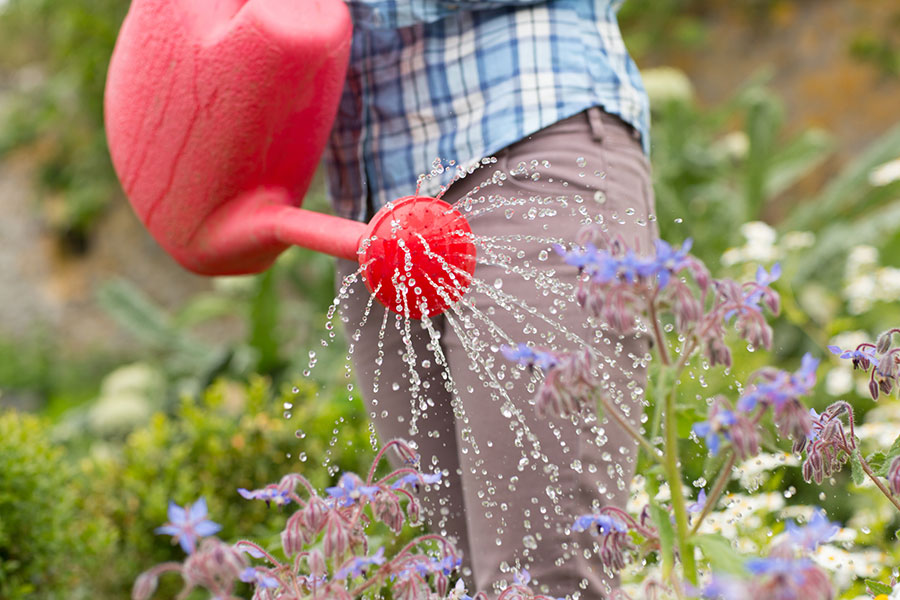Be Waterwise This Summer
As the warm weather continues, gardeners who don’t want to be slaves to the hosepipe will be looking at ways to be waterwise. Experts offer tips on how to save water this summer
We may have had the warmest spring on record, but last winter was also the wettest, so we are a long way from a drought and hosepipe ban.
However, with experts predicting the dry weather is here to stay, gardeners will be working out ways to save water.
The Royal Horticultural Society offers the following tips to gardeners who want to put the water where it’s most needed:
:: Established trees and shrubs do not generally need watering as they have such wide-ranging roots that they are drought-proof. However, their growth may be improved by watering when they are under drought stress
:: Trees and shrubs planted less than five years ago have increased water requirements and may suffer drought stress without watering
:: Newly sown or newly planted areas are very vulnerable to water stress, so watering these should be a high priority
:: Herbaceous perennials often need watering to boost their performance in hot, dry spells. Plant choice is crucial if you want to achieve a drought-proof border. Drought resistant plants include cordyline, hebe, lavender, Verbena bonariensis, eryngium, euphorbia, diascia, cosmos, gazania, nemesia and, of course, pelargoniums. Many drought-tolerant plants have silver or grey-green leaves, their light leaf colour reflecting the harsh rays of the sun.
:: The yields and quality of vegetables and fruit are greatly improved by watering at times when drought stress would affect the part of the plant that is gathered. Leafy crops such as lettuce and spinach should never be short of water. Onions require little or no watering. Most other crops need watering at sowing and transplanting time, and then again as the fruits, roots or tubers are developing. It is also a good idea to give a single, thorough watering about two weeks before harvest
:: Lawns require great quantities of water for thorough irrigation, but instead of watering in dry periods, mow less closely and less frequently. Brown patches usually recover when the autumn rains return.
:: Mulching with a layer of organic matter or gravel at least 5cm (2in) thick reduces moisture loss from the upper layers of the soil.
Less than 3% of the annual water consumption of an average household is estimated to be from garden use, but at peak times as much as 70% of water supplied may be used in gardens.
Even in dry districts, 24,000 litres (5,280 gallons or 150 water butts) could be collected from the roof each year, says the RHS.
Sean Laverick of the Homebase Garden Academy advises waterwise gardeners to store their water in water butts and invest in a water butt pump which enables you to use your hose with a water butt.
“Most garden watering should be aimed specifically at the stem bases beneath the foliage canopy, leaving the surrounding soil dry,” he says. “This helps to limit weed problems and ensures all the water goes where it is needed.”
If you are short of time, invest in seep hoses, which have holes in them to deliver water accurately to established plants and plants in rows. They can be hidden beneath soil or mulch, which also avoids evaporation losses and work best on heavy soil where the water spreads further sideways as it sinks than on lighter soils.
Automated irrigation systems are another option to save time and labour. They feature drip or trickle irrigation systems and some are remotely operated through sensors which can monitor when your soil needs watering.
Mix water storing gel in with the compost in your container plants, to save and store a lot of the water you normally use, the gel slowly releasing water to the roots.
Keep your soil as wet as possible – mulch on the ground surface prevents evaporation from the soil, providing increased moisture retention. Some lawnmowers now have mulching plugs that return fine grass cuttings back on to the lawn’s surface.
Finally, says Sean, don’t panic: “Long-term weather predictions should still see summer rain which will allow plants to thrive over the summer, so just make sure you’re making the most of the rain that comes your way.”
For more information, visit www.rhs.org.uk
What is your garden watering routine in the summer?
Latest posts by Sally - Silversurfer's Editor (see all)
- Do you eat a chocolate digestive with the chocolate facing up or down? - April 24, 2025
- More to explore: A life positive journey after 50 - April 24, 2025
- Do you snore? - April 24, 2025
- UK ban on EU cheese and meat: What it means for you - April 19, 2025
- Would you support personalised health MOTs at retirement age? - April 19, 2025



















